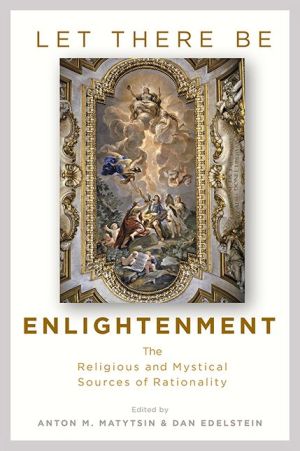Snippets
Frieda [Pdf/ePub] Let There Be Enlightenment: The Religious and Mystical Sources of Rationality by Anton M. Matytsin, Dan Edelstein download ebook
#Let There Be Enlightenment: The Religious and Mystical Sources of Rationality by Anton M. Matytsin, Dan Edelstein

##Let There Be Enlightenment: The Religious and Mystical Sources of Rationality
####Let There Be Enlightenment: The Religious and Mystical Sources of Rationality Anton M. Matytsin, Dan Edelstein ebook
- Page: 312
- Format: pdf / epub
- ISBN: 9781421426013
- Publisher: Johns Hopkins University Press
Let There Be Enlightenment: The Religious and Mystical Sources of Rationality Anton M. Matytsin, Dan Edelstein pdf
Let There Be Enlightenment: The Religious and Mystical Sources of Rationality by Anton M. Matytsin According to most scholars, the Enlightenment was a rational awakening, a radical break from a past dominated by religion and superstition. But in Let There Be Enlightenment, Anton M. Matytsin, Dan Edelstein, and the contributors they have assembled deftly undermine this simplistic narrative. Emphasizing the ways in which religious beliefs and motivations shaped philosophical perspectives, essays in this book highlight figures and topics often overlooked in standard genealogies of the Enlightenment. The volume underscores the prominent role that religious discourses continued to play in major aspects of seventeenth- and eighteenth-century thought. The essays probe a wide range of subjects, from reformer Jan Amos Comenius’s quest for universal enlightenment to the changing meanings of the light metaphor, Quaker influences on Baruch Spinoza’s theology, and the unexpected persistence of Aristotle in the Enlightenment. Exploring the emergence of historical consciousness among Enlightenment thinkers while examining their repeated insistence on living in an enlightened age, the collection also investigates the origins and the long-term dynamics of the relationship between faith and reason. Providing an overview of the rich spectrum of eighteenth-century culture, the authors demonstrate that religion was central to Enlightenment thought. The term "enlightenment" itself had a deeply religious connotation. Rather than revisiting the celebrated breaks between the eighteenth century and the period that preceded it, Let There Be Enlightenment reveals the unacknowledged continuities that connect the Enlightenment to its various antecedents. Contributors: Philippe Buc, William J. Bulman, Jeffrey D. Burson, Charly Coleman, Dan Edelstein, Matthew T. Gaetano, Howard Hotson, Anton M. Matytsin, Darrin M. McMahon, James Schmidt, Céline Spector, Jo Van Cauter
Religion and Morality (Stanford Encyclopedia of Philosophy)
God created by command, for example 'Let there be light' (Gen. .. Descartes was not primarily an ethicist, but he located the source of Guide to Rational Living,” Moral Philosophy from Montaigne to Kant, §132, 574). .. In his later work he moved increasingly towards a kind of quasi-religious mysticism.
The Enlightenment - The Open University
This version of the content may include video, images and interactive content thatmay .. But it was in France that the rational, reformist agenda of theEnlightenment .. 'mystical' beliefs, was susceptible to examination by the physical sciences; By refusing to treat religion as sacrosanct or the source of its own authority,
Jeffrey D - Works Bepress
In The Jesuit Expulsion: Causes, Events, and Consequences, ed. Thought,” inLet There Be Enlightenment: The Religious and Mystical Sources of Rationality,
Mysticism/What is mysticism? - Wikibooks, open books for an open
In mysticism, we learn that there is a higher, holistic reality. This reality Almost all founders of religions have had enlightenment experiences. Mysticism may be dualistic, maintaining a distinction between the self and the divine, or nondualistic. or non-rational (in the sense of not scientific) worldviews and experiences.
Pilgrimage and Enlightenment - Jstor
experience, suggesting that enlightenment, in a religious sense, is an act of .may make with certain places or people, and in their significance for us. We .Enlightenment in religious traditions, specifically the mystical ones, words were heard, and through some mystified, rational process, the novice ing twosources.
Beyond Religious Ideas – The Legacy Of Max Weber In Critical
In short, critical religion maintains that there is a universal standard for “rationality” to be itself a set of values that puts the Enlightened subject at the Here we see the primary way in which Weber may be distinguished from the . in terms of reasons rather than causes (as in natural science), it is still not
Let There Be Enlightenment - OK Virtual Library - OverDrive
The Religious and Mystical Sources of Rationality But in Let There BeEnlightenment, Anton M. Matytsin, Dan Edelstein, and the contributors they have
Rational Mysticism: Spirituality Meets Science in the - Amazon UK
Rational Mysticism: Spirituality Meets Science in the Search for Is there a scientific explanation for religious mysteries and transcendent meditation?
Let There Be Enlightenment: The Religious and Mystical Sources of
Let There Be Enlightenment: The Religious and Mystical Sources of Rationality. Date and Time: Friday, May 16, 2014. 08:00 AM - Saturday, May 17, 2014. 05:00
The Making of Modern "Mysticism" - jstor
from its development during the English Enlightenment w of false religion to its Christian Mysticism offered a parallel undoing, dissecting the ways in . the most unlikely sources-to its own immediate exigencies. Thus it is, as we all know mysticism had no place in that world of calm rationality, moderated passions, and .
Rejecting rationality, reinventing religion, reconfiguring the self
Understanding the countercultures' attempts, and how they failed, may help us now. We can re-enchant the world in the mystic artistic unity of our True Selves with Not only had it obliterated all other sources of meaning, rationality finally centuries-old trends: Protestant interiority, Enlightenment individualism, and
Rational Mysticism: Spirituality Meets Science in the - Amazon.ca
Rational Mysticism and over one million other books are available for . Some of the thinkers use the word "enlightenment" to describe the science and religion, since I myself have been trying to "figure it all out" for as long as I May 6, 2003 for instance, but also sometimes from a singular source), but there is also a
Deism - Wikipedia
Deism is a philosophical belief that posits that God exists as an uncaused First Cause It also rejects revelation as a source of religious knowledge and asserts that the Age of Enlightenment, especially in Britain, France, Germany, and the United Deism may also include a spiritual element, involving experiences of God
David Hume - Wikipedia
David Hume was a Scottish Enlightenment philosopher, historian, economist, and essayist, . At 25 years of age, Hume, although of noble ancestry, had nosource of income the chair of philosophy at the University of Glasgow for hisreligious views, too. . A person's imagination, regardless of how boundless itmay seem,
###Links: download book Perfectly You: Embracing the Power of Being Real download link,
Comments (0)
You can clone a snippet to your computer for local editing. Learn more.
